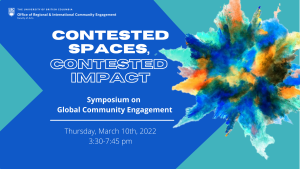

The Office of Regional and International Community Engagement (ORICE) will host the 2022 Symposium on Global Community Engagement on Thursday, March 10th, 2022. The theme of the symposium for this year is “Contested Spaces, Contested Impact”, and we invite students at all academic levels to present on their community engaged scholarship. A broad interpretation of the theme is welcomed, but in selecting it we have considered some of the many questions that arise in community-university collaborations including physical and psychological questions of belonging, safety and power. We have considered conflicting and differently understood standpoints, expectations, motivations and purposes of engagement and in turn consider how the question of meaningful impact is also contested. Impact for who? By who? In what ways?
We look forward to engaging in dialogue and learning together about these and many other questions throughout the symposium.
Registration
Due to the ongoing COVID-19 pandemic, this symposium will be primarily virtual on Zoom. All sessions will be offered online and there will be one in-person session to watch the keynote and debrief with fellow colleagues.
Schedule
| Time (PST) | Session | Presenters |
|---|---|---|
| 3:30-4:30 pm | Concurrent Session 1 | |
| 1a. Exploring Community-Based Research and Data Justice. An introduction to a new resource guide produced by the UBC Gender + in Research Collective (Zoom) | Anneke Dresselhuis, Balie Tomar, Kristin Kilgallen, Sophie Sargent, Victoria Barclay and Solal Quere. | |
| 1b. Engage community to envision community: Co-creating a food hub on campus. (Zoom) | Min Kim, Amy Dong, Raveena Gowda and Shadow Feng (UBC Wellbeing) | |
| 1c. Mapping of Unchartered COVID-19 Evictions: Are Women Disproportionately Affected by Job Loss? (Zoom) | Cheryl Lee Madden |
|
| 4:30-5:00 pm | Break | |
| 5:00-6:30 pm | Keynote: Transforming Research Through Community-led Processes | Dr. Sasha Costanza-Chock |
| a. Online through Zoom | ||
| b. In-person watch party at the Place of Many Trees in the Liu Institute | ||
| 6:30-6:45 pm | Break | |
| 6:45-7:45 pm | Concurrent Session 2 |
|
| 2a. Working with the Power and Positionality Wheel for Food Justice and Systems Change. (Zoom) | Mikaela Hudson, Joanne MacKinnon (Little Mountain Neighbourhood House) | |
| 2b. It’s Not Gender as Usual: Guiding Questions for Transformative Intersectional Gender+ Research (Zoom) | Claire Okatch, Hannah Facknitz, Elaina Nguyen | |
| 2c. Youth Climate Ambassadors Project (Zoom) | Esme Decker, Anna Brookes, George Radner (UBC Climate Hub and Be the Change Earth Alliance) | |
| 2d. Compassion over comprehension. Examining and challenging the implications of the gender binary and the colonial us vs them mindset. (Zoom) | Nasyta Mozolevych and Jay Quong | |
| 2e. Post-keynote discussion and networking in the Place of Many Trees, Liu Institute. (Zoom) | Hosted by SPPGA REDI Collective Members | |
Keynote Speaker: Dr. Sasha Costanza-Chock
Transforming Research Through Community-led Processes
Join Dr. Costanza-Chock in a discussion about design justice principles and how these principles can transform community-engaged scholarship.
Note: For those who would like to watch the keynote with other UBC community members and debrief over a light meal, we will be hosting a watch party and debrief session in the Place of Many Trees in the Liu Institute on campus. Individuals can select this option on the registration form.


Sasha Costanza-Chock (they/she/elle/ella) is a researcher and designer who works to support community-led processes that build shared power, dismantle the matrix of domination, and advance ecological survival. They are a nonbinary trans* femme. Sasha is known for their work on networked social movements, transformative media organizing, and design justice. Sasha is the Director of Research & Design at the Algorithmic Justice League (ajlunited.org), a Faculty Associate with the Berkman-Klein Center for Internet & Society at Harvard University, and a member of the Steering Committee of the Design Justice Network (designjustice.org). They are the author of two books and numerous journal articles, book chapters, and other research publications. Sasha’s latest book, Design Justice: Community-Led Practices to Build the Worlds We Need, was published by the MIT Press in 2020.
Concurrent Sessions Descriptions
Exploring Community-Based Research and Data Justice. An introduction to a new resource guide produced by the UBC Gender + in Research Collective.
Session 1a: 3:30-4:30pm (Zoom)
Presented by Anneke Dresselhuis, Balie Tomar, Kristin Kilgallen, Sophie Sargent, Victoria Barclay and Solal Quere
The UBC ORICE Gender+ Data Justice Guide project originated in May 2020 with the numerous calls for the collection of disaggregated data along multiple axes of identity, many of which were amplified by the ongoing COVID-19 pandemic. Five cohorts of student researchers have produced a guide on how data justice principles can be centered during community-based research projects, through a series of reflexive questions. During this interactive workshop, participants will engage in exercises designed to inspire critical questions about data justice thinking. Such questions will consider how research workflows can better tune into the frequency of historically marginalized narratives that are systemically excluded for more just processes and outcomes.
Engage Community to Envision Community: Co-Creating a Food Hub on Campus
Session 1b: 3:30-4:30pm (Zoom)
Presented by: Min Kim, Amy Dong, Raveena Gowda, Shadow Feng (UBC Wellbeing)
The UBC Community Food Hub Project is a research study supported by the Campus as a Living Lab Initiative and UBC Wellbeing. Since April 2021, a team of Student Community Developers at the Vancouver campus has been spearheading community engagement based in Community-Based Participatory Action Research (CBPAR) methodology to co-create a community food hub that facilitates dignified access to healthy food, social connection, and holistic wellbeing. Through an iterative phased approach, the research team is engaging key campus food security stakeholders and community members whose contributions are directly informing the design, operations, indicator framework, and governance of the physical food hub. During our session, we will be navigating prominent questions and challenges that relate to the contested impact of community engaged research, especially with disproportionately impacted communities, in campus-based food security.
Mapping of Uncharted COVID-19 Evictions - Are Women Disproportionately Affected by Job Loss?
Session 1c: 3:30-4:30pm (Zoom)
Presented by Cheryl-Lee Madden
Research shows that women are disproportionately affected by COVID-19 job loss. COVID-19 focused our attention on front-line essential service retail workers, mainly women. They now experience dilemmas over belonging, safety, and power. Women could respond by expressing, as feminist Leslie Kern suggests, their “embodied experiences of city life, refusing to be taken for granted.” The emerging COVID-19 pandemic impacts are likely to have gendered consequences that have a relationship with Kain’s Spatial Mismatch hypothesis. Spatial mismatch could explain women’s labour market recovery within Vancouver’s transnational influence and indigenous diaspora. These components affect spatiality and polarization of wealth concentration.
Working with the Power and Positionality Wheel for Food Justice & Systems Change
Session 2a: 6:45-7:45pm (Zoom)
Presented by: Mikaela Hudson, Joanne MacKinnon (Little Mountain Neighbourhood House)
This interactive workshop invites participants to reflect on their own power and privilege using the Power & Positionality Wheel, a tool for unpacking our complex identities as learners, scholars, and activists. It uses stories from food justice work during the COVID-19 pandemic to illustrate how the Power & Positionality Wheel can center conversations about identity and equity in community partnerships, highlighting the potential for surprising and transformative results. The presenter draws on her own experiences as an academic-activist in the Building Collective Food Security Resilience Project to support participants to complete their own Power & Positionality Wheels in real time, inviting them to explore the revelatory and sometimes uncomfortable spaces that this tool for self-reflexivity generates.
It’s Not Gender as Usual: Guiding Questions for Transformative Intersectional Gender+ Research
Session 2b: 6:45-7:45pm (Zoom)
Presented by: Claire Okatch, Hannah Facknitz, Elaina Nguyen
What does it take to conduct gender+ research that is thoughtful and has meaningful impact within the contested space of the academy? Is such work even possible? Our project, the ‘It’s Not Gender As Usual’ guide is a resource made for academics curious about thinking through the complexities and contradictions that accompany undertaking gender+ research within the hierarchical and neoliberal space of the academy. Structured as a question guide, we offer prompts and considerations that acknowledge the imperfect nature of undertaking research that attempts to challenge power structures. We welcome all of those interested in gender+ questions—whether experienced or new to the topic—to join us in conversation as we introduce and explore some topics within the guide.
Youth Climate Ambassadors Project
Session 2c: 6:45-7:45pm (Zoom)
Presented by: Anna Brookes, Esme Decker (UBC Climate Hub)
Current climate narratives often focus on the apocalyptic, hopeless aspects of the climate crisis which can be paralyzing, demoralizing, and overall ineffective for mobilizing students to act. The Youth Climate Ambassadors Project offers an alternative perspective that highlights how the climate movement can be filled with hope, community, and purpose. This presentation will move through a storytelling framework that has proven to sway political decisions on climate policy, especially when utilized by youth. The project aims to create a space for youth to discuss personal experiences and emotional/wellbeing implications of climate change, to share feelings or worries about the future, and to build confidence in public speaking and personal storytelling skills and taking up space in the narrative. The project also aims to provide inspiring and motivating examples of youth climate ambassadors through peer-to-peer facilitation from UBC students and videos of local activists, in order to show that youth voices are powerful and able to make change.
Compassion over comprehension. Examining and challenging the implications of the gender binary and the colonial us vs them mindset
Session 2d: 6:45-7:45pm (Zoom)
Presented by: Nastya Mozolevych and Jay Quong
This community discussion will center around the importance of having compassion over comprehension in order to challenge the colonial “us vs. them” mindset. We will pivot off the Man Enough podcast episode: The Urgent Need for Compassion featuring ALOK (they/them), a non-binary scholar, performer, artist, and public speaker. ALOK discusses the violence of the colonial gender binary and invites listeners to step into our power as well as the power of interdependence. We will intersperse clips from the podcast and then pose open-ended questions that will engage the audience in discussion about ALOK’s remarks and their impact on us.
Post-keynote discussion and networking
Session 2e: 6:45-7:45pm, Location: the Place of Many Trees, Liu Institute.
Hosted by SPPGA REDI Collective Members
Join members from the School of Public Policy and Global Affairs REDI collective, as they host a follow-up discussion and debrief on the topics raised during the keynote address with Sasha Constanza-Chock. Participants are invited to consider how principles of design justice and data justice are related to our own studies, research and future aspirations. This is an IN-PERSON session only that will be held in the Place of Many Trees in the Liu Institute and will include some informal opportunities to meet new colleagues from across campus. Light snacks will be provided. This session is open to UBC students, staff and faculty only and attendees must be pre-registered (select the option in the registration form).